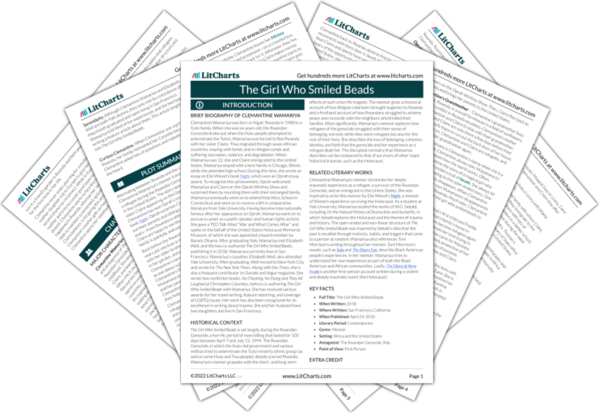Throughout The Girl Who Smiled Beads, Clemantine Wamariya critiques society’s charity toward refugees and survivors. When Clemantine arrives in the United States after years of being a refugee in war-torn Africa, she is appalled by the extent to which most American families live in excess. While gawking at her host family’s well-stocked fridge, she wonders how it is possible that one part of the world has so little while another part has so much. As she settles into American society, people with resources are eager to help her as a refugee and war survivor with less than them. However, Clemantine observes that their desire to give her resources is mostly selfish, and that their charity creates a hierarchy between the fortunate and the less fortunate: people who give charity often think of themselves as superior to the people in need. Moreover, charitable people, whether consciously or unconsciously, often expect some kind of repayment or debt of gratitude from the people they’ve helped.
Even as Clemantine becomes a famous humanitarian and achieves an affluent lifestyle (flying on private jets and staying in fancy hotels), she maintains her belief that no one, no matter how much or little they have, is any better or worse off than anyone else. As she tells her story to the public, she tires of people imposing their lifestyle on her through their charity instead of seeing that they, too, can learn from her story. This leads Clemantine to develop a philosophy of sharing in which everyone has something—whether it is resources or perspective—that the other needs. In her philosophy, collaboration is the only way to truly rectify a refugee’s shattered life. Sharing will create a society in which people who have less are no longer viewed as inferior. In describing her experience as a former refugee and Rwandan immigrant, Clemantine Wamariya thus calls on readers to share with the people around them and, in doing so, create a more equal society.
Charity vs. Sharing ThemeTracker

Charity vs. Sharing Quotes in The Girl Who Smiled Beads
Boxing ourselves into tiny cubbies based on class, race, ethnicity, religion—anything, really—comes from a poverty of mind, a poverty of imagination. The world is dull and cruel when we isolate ourselves.
Survival, true survival of the body and soul, requires creativity, freedom of thought, collaboration. You might have time and I might have land. You might have ideas and I might have strength. You might have a tomato and I might have a knife. We need each other.

Unlock explanations and citation info for this and every other The Girl Who Smiled Beads quote.
Plus so much more...
Get LitCharts A+I need more than the artifacts stuffed into a suitcase. I need to comprehend my history, a deep history. I know the facts about the genocide […] But that is not enough. The past, that story, cannot fill me. I need a longer, broader, more fully human backstory, a history not all soaked in blood. I need clarity, perspective, joy, beauty, originality, intelligence, a wide-angle view.
The transaction that resulted from sharing my story often bothered me. Some wanted to help me and could not stand the idea that I was not defeated. Panic flashed across their faces when I suggested to those who considered themselves more powerful than me that the transaction could go both ways. That I could help them too.
Insist on knowing the backstory to your gifts and your pain. Ask yourself how you came to have all the things you carry; your privilege, your philosophy, your nightmares, your faith, your sense of order and peace in the world.











